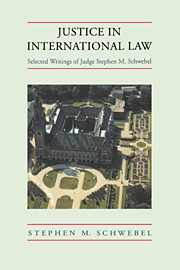Book contents
- Frontmatter
- Contents
- Preface
- PART I International Court of Justice
- PART II International Arbitration
- 10 Arbitration and the Exhaustion of Local Remedies (with J. Gillis Wetter)
- 11 Arbitration and the Exhaustion of Local Remedies Revisited
- 12 Some Aspects of International Law in Arbitration Between States and Aliens
- 13 The Majority Vote of an International Arbitral Tribunal
- 14 The Prospects for International Arbitration: Inter-State Disputes
- PART III United Nations
- PART IV International Contracts and Expropriation
- PART V Aggression under, Compliance with, and Development of International Law
- List of publications
- Index
10 - Arbitration and the Exhaustion of Local Remedies (with J. Gillis Wetter)
Published online by Cambridge University Press: 06 November 2009
- Frontmatter
- Contents
- Preface
- PART I International Court of Justice
- PART II International Arbitration
- 10 Arbitration and the Exhaustion of Local Remedies (with J. Gillis Wetter)
- 11 Arbitration and the Exhaustion of Local Remedies Revisited
- 12 Some Aspects of International Law in Arbitration Between States and Aliens
- 13 The Majority Vote of an International Arbitral Tribunal
- 14 The Prospects for International Arbitration: Inter-State Disputes
- PART III United Nations
- PART IV International Contracts and Expropriation
- PART V Aggression under, Compliance with, and Development of International Law
- List of publications
- Index
Summary
Where a State and an alien agree in a contract to arbitrate disputes relating to the contract, in terms which indicate that arbitration is to be the exclusive remedy, need the alien exhaust any other remedy before an international claim may be presented relating to a dispute which falls within the scope of the arbitration clause?
New light has been shed on this unresolved question by the Convention on the Settlement of Investment Disputes between States and Nationals of Other States which has been submitted to governments by the Executive Directors of the International Bank for Reconstruction and Development. Article 26 of the Convention provides:
Consent of the parties to arbitration under this Convention shall, unless otherwise stated, be deemed consent to such arbitration to the exclusion of any other remedy. A Contracting State may require the exhaustion of local administrative or judicial remedies as a condition of its consent to arbitration under this Convention.
The Report of the Executive Directors on the Convention states with regard to “Arbitration as exclusive remedy” that:
32. It may be presumed that when a State and an investor agree to have recourse to arbitration, and do not reserve the right to have recourse to other remedies or require the prior exhaustion of other remedies, the intention of the parties is to have recourse to arbitration to the exclusion of any other remedy. This rule of interpretation is embodied in the first sentence of Article 26. […]
- Type
- Chapter
- Information
- Justice in International LawSelected Writings, pp. 171 - 190Publisher: Cambridge University PressPrint publication year: 1994



